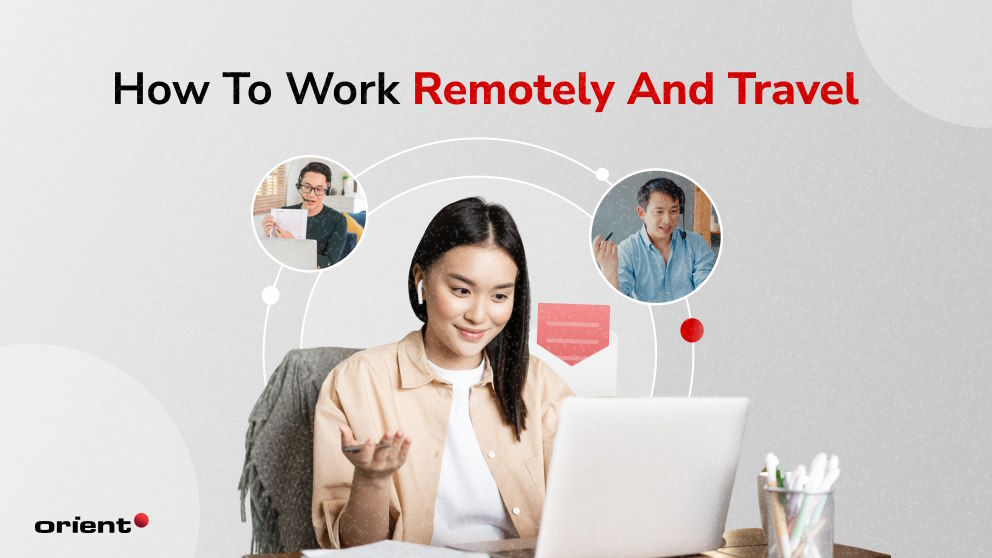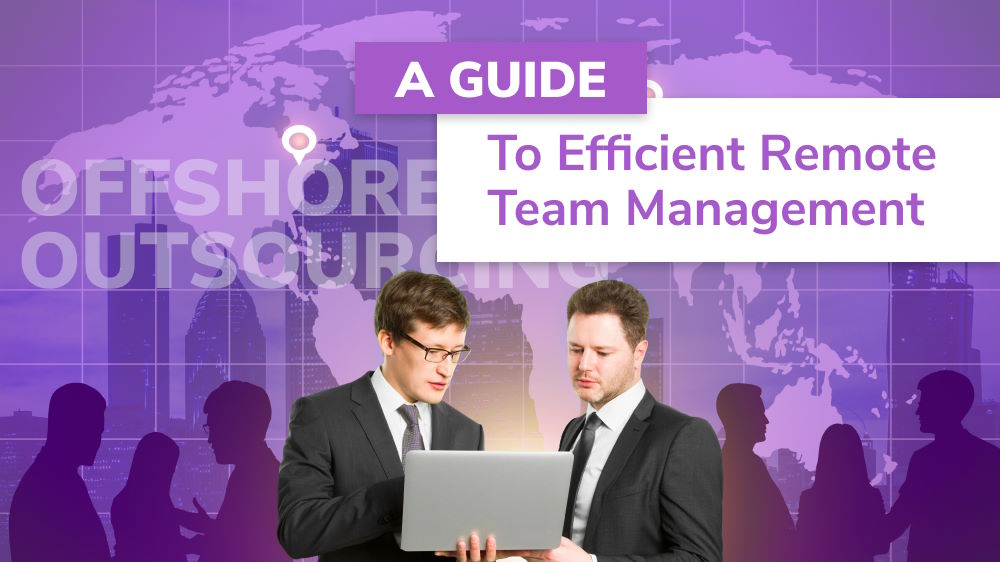Embracing the Digital Nomad Lifestyle: How to Work Remotely and Travel

Content Map
More chaptersRemote work has come a long way. One of the most attractive perks of remote working undoubtedly is the ability to work from whatever location you choose - be it your home office, a coffee shop, or even on a beach in the neighboring country.
Working remotely and traveling? Many would give up anything to have that power. Remote work is a blessing, definitely, but it also can be a curse. It can be tricky to navigate work when you are tempted by the novelty of a foreign country. So, how do you perform remote work effectively and travel at the same time? Here are the essential tips for juggling work and travel.
What Is a Digital Nomad?

Definition
Self-employed people, independent contractors, and employees who operate remotely are referred to as digital nomads. By using the internet, they can stay in touch with their employees, coworkers, and clients, whether traveling domestically or abroad.
How Do You Get Started as a Digital Nomad?
If the concept of working as a digital nomad interests you, know that there is more than one way for you to get started. It is important to understand what kind of digital nomad style fits you the most.
Location-independent
Location-independent is a broad term that refers to a worker or entrepreneur who works and earns income from anywhere, which often is online. Being location-independent means you are tied to a location or need to be physically present. There is no need for you to be present in a specific city, province, country, or continent to make money. This means that digital nomads, of course, are covered under this term.
Many location-independent people still remain at home, even though many of them lead a minimalistic lifestyle, giving up their cars and apartments to travel. If these people choose to leave their home country and embark on a trip, however, operating their borderless business from anywhere in the world wouldn’t be a problem for them.
Home-based Nomads
Home-based nomads have a place they return to from their remote work trip. This could be a semi-permanent or permanent location they return to in between adventures. There are many reasons several digital nomads prefer this lifestyle rather than being location-independent. It might be the comfort of having stability and routine, a reliable internet connection at all times, a community they can connect to, cultural immersion, or perhaps the fact staying in one place long-term is more cost-efficient. Being a home-based nomad is also a great choice if you are looking to travel on remote work trips between leases or if you want to rent your home out now and then when you are on adventures.
“Slo-mads”
The word “slomad” or “slowmad” combines the terms “slow” and “nomad”. A slomad is a person who travels slowly and stays in one location for two to six months at a time. Some digital slomads may even stay at the same home base for an entire year. This lifestyle is suitable for those looking to budget their adventures more carefully while still allowing themselves to be immersed in the local culture.
Work Remotely and Travelling

Being able to work remotely and travel simultaneously provides employees with a healthy work-life balance. There are a few differences between working as a digital nomad and a full-time employee to whom you need to pay attention.
As a Digital Nomad
No matter what style of digital nomad lifestyle you choose to go with, working as a digital nomad gives you more freedom to move around and relocate.
If you are an independent contractor or a freelancer, the company you are working with can’t restrict your working location. Therefore, you have the freedom to move around from city to city or country to country and freely provide your services from another location.
If you are a remote employee, there are often more restrictions. You need to meet certain location-based requirements to maintain employment eligibility. Hence, it is easier to travel within the country, but if you are looking into working remotely abroad, proceed with much more caution.
As a Full-Time Employee
Remote employees can enjoy the flexibility of taking vacations without any restrictions. However, if you plan on temporarily relocating to a different location, it’s important to keep in mind that it may affect your residency and tax status.
Additionally, as a hybrid remote full-time employee, you may be required to spend some time working in the company office, so moving to another location is out of the question. That being said, short-term relocations to different cities within the same country are often possible.
Lastly, if you are a full-time remote employee, you can still satisfy your wanderlust and travel the world as long as you adhere to your employer’s guidelines and policies.
Legal Considerations When Working Remotely While Traveling

In theory, all you need as a digital nomad is a laptop and a decent internet connection. However, the reality isn’t often as plain and simple. Employment laws are often created only for workers who work in one place. Hence, as someone who works remotely, there are some legal considerations you need to keep in mind.
Visas
Visa requirements are different depending on the country. Even though some countries have introduced digital nomad visas to attract remote workers, working remotely is still generally considered a grey area. Therefore, carefully go over the visa requirements and see if the visa explicitly allows work or demands you acquire a separate one.
If your country has offices in the destination country, they may be able to apply for a work visa on your behalf. If not, a temporary business travel visa may be available. But again, be sure to go over the visa requirements.
Taxes
As a digital nomad, it’s essential to be aware of tax laws in both your home country and the country you’re visiting to avoid legal complications. If you’re living in a foreign country for less than six months, you’re usually not liable to pay taxes on your foreign income. However, if you exceed 183 days, you may be required to pay taxes. Additionally, your company may become liable for paying taxes if your work becomes a permanent outpost. Understanding remote tax laws and your tax obligations is crucial if you plan to work and travel legally.
Employment Laws
Make sure to look up the employment laws before you decide to travel since every country’s laws are different. If you are a full-time employee working online and want to travel, contact your HR department first to find out more about the company’s remote work policies. Working online doesn’t always mean you can work remotely.
Tips for Remote Workers

Last but not least, here are some useful tips if you are looking to transition into the digital nomad lifestyle.
Review The Company’s Mobility Policy
If you are working for a technology company, it is likely that remote working is the preferred working arrangement. Working remotely is also frequently the default way of working in offshore development outsourcing or any software outsourcing services in general. Therefore, if you work in the mentioned industries, it would be easier for you to work remotely and travel.
However, you should always check your company’s mobility policy before making any major traveling decisions.
Don’t Treat Working Remotely Like a Vacation and Plan Your Workload
Traveling while working remotely doesn’t mean you’re on vacation. The line does get blurry from time to time, but it is best to step into this lifestyle, being as realistic as possible and thoroughly understanding the working requirements.
Moving constantly while working is undoubtedly draining and might even negatively affect your productivity. Here is what you can do to keep up with work expectations while also getting to do sightseeing:
- List all the tasks you have on your plate. Complete as many tasks as you can before you decide to do any sightseeing. If the tasks aren’t completed on time, find time to incorporate them into your itinerary.
- Track your work hours. Your estimations might be off at first, but as time goes on, you’ll learn how to make better estimations and plan your workload accordingly.
- Set aside blocks of time where you are highly focused and dedicated to your work. Squeezing in work during layovers between flights or a long train ride is also a good idea.
Secure and Stable Internet Connection
Plan to stay connected wherever you go. Don’t rely on public WiFi from your Airbnb, hotel, coffee shops, or public spaces. Public WiFis is also known to be a prime target for hacking - the last thing you want on your trip is to deal with security issues like data breaches or data theft.
Therefore, protect your data by using a VPN (short for virtual private network). A VPN’s primary goal is to mask or obfuscate a user’s IP address so that no one can monitor their online activities.
If you often travel a lot, consider investing in a portable hotspot. This will solve a lot of your problems by providing you with extra good internet.
Time Zone Differences
If your company requires you to be online during certain hours, if you need to meet the deadlines for important tasks, or participate in meetings, it is crucial to understand the different time zones. Being aware of the time zone differences also means you won’t always be getting the information you need since your colleagues might be resting while you are working and vice versa. Therefore, one of the downsides of working remotely and traveling is the unwanted delays.
Create An Office-Packing Checklist
Being on adventures is fun, but one downside is the packing you need to do. Some essential office items you’ll need while on vacation include a laptop, personal hotspot, tablet, a mouse, external keyboard, lightweight, portable monitor, noise-canceling headphones, notebook, pens, and the list goes on, depending on your work demands.
Be sure to pack causal smart outfits for important Zoom meetings as well; you want to look professional during meetings with important clients or with your boss.
Orient Software Remote Work Opportunities to Advance Your Career
Are you enticed by the idea of working remotely from anywhere in the world? If yes, and you are ready to embark on this exciting journey, Orient Software welcomes you to join their team. At Orient Software, we take care of all the necessary arrangements to ensure that our staff can enjoy the benefits of working from their chosen location. You don’t have to worry about any legal or logistical challenges, as we have got you covered. Contact us today to learn more about our remote work opportunities.







